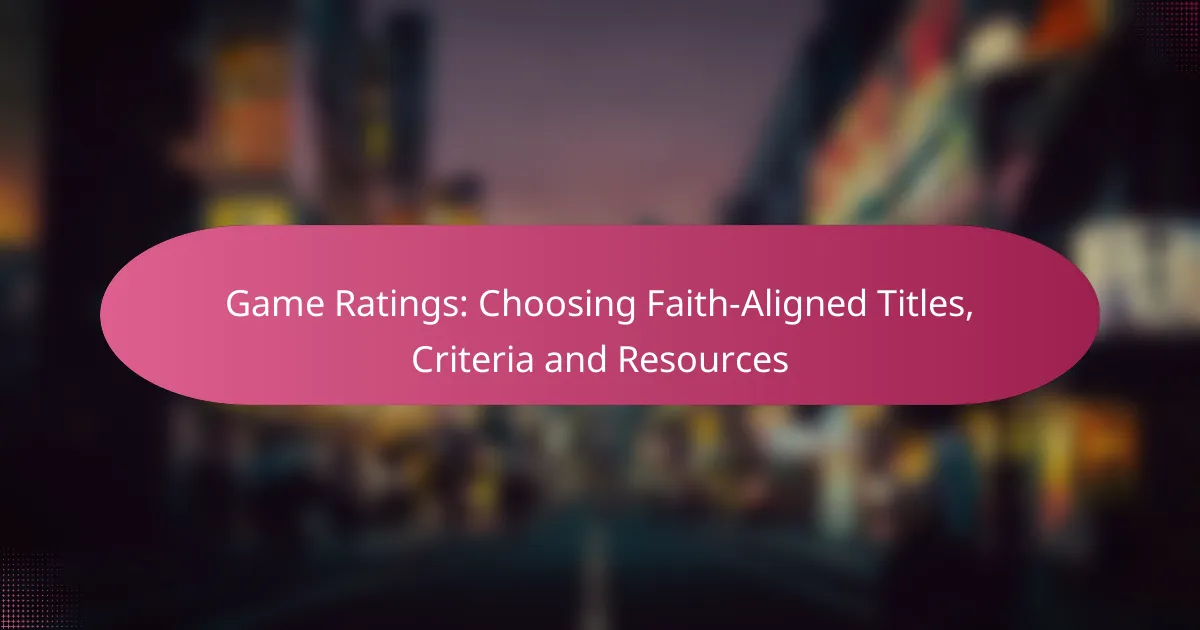Choosing faith-aligned game titles requires careful evaluation of content to ensure they align with personal values and beliefs. By assessing themes, narratives, and community feedback, players can identify games that reflect their faith principles. Various resources are available to help evaluate game ratings based on moral and ethical standards, guiding players in making informed choices that resonate with their values.

How to choose faith-aligned game titles?
Choosing faith-aligned game titles involves evaluating the content of games to ensure they resonate with your values and beliefs. This process includes assessing game themes, narratives, and community feedback to find titles that reflect your faith principles.
Assess game content for values alignment
Start by examining the game’s storyline, characters, and overall message. Look for themes that promote positive values such as kindness, integrity, and respect. Avoid titles that include excessive violence, explicit content, or themes that conflict with your beliefs.
Consider using game rating systems that highlight content types, such as the Entertainment Software Rating Board (ESRB) or Pan European Game Information (PEGI). These ratings provide insights into the game’s suitability based on age and content descriptors, helping you make informed choices.
Consult faith-based gaming reviews
Seek out reviews from faith-based gaming websites or blogs that evaluate games through a spiritual lens. These resources often provide detailed analyses of how well a game aligns with specific values and beliefs. Look for reviews that discuss both the positive and negative aspects of gameplay in relation to faith.
Some popular faith-oriented review sites include Plugged In and Christian Gaming. These platforms can help you identify games that not only entertain but also enrich your spiritual journey.
Engage with community recommendations
Participate in online forums or social media groups focused on faith-based gaming. Engaging with like-minded individuals can provide valuable insights and recommendations for games that align with your values. Ask for suggestions and share your experiences to foster a supportive community.
Consider platforms like Reddit or Discord, where you can find dedicated channels for discussing faith-aligned games. These communities often share personal stories about how certain games have positively impacted their faith and can guide you toward titles worth exploring.

What criteria should be used for evaluating game ratings?
Evaluating game ratings involves assessing several key criteria that reflect the game’s content, mechanics, and suitability for different age groups. These criteria help players and parents make informed decisions about which games align with their values and preferences.
Content themes and messages
Content themes and messages are crucial for determining whether a game aligns with personal or faith-based values. Consider the overarching narratives, character development, and moral dilemmas presented in the game. For example, games that promote teamwork and kindness may be more suitable than those that glorify violence or unethical behavior.
When evaluating a game’s themes, look for reviews or summaries that highlight its messages. This can help identify if the content resonates positively with your beliefs or if it raises concerns.
Gameplay mechanics and engagement
Gameplay mechanics and engagement refer to how players interact with the game and the overall experience it provides. Consider whether the mechanics encourage positive social interactions or foster competition and aggression. Games that promote collaboration and problem-solving can be more beneficial than those that focus solely on individual achievement.
Engagement levels can also vary; some games may offer short play sessions, while others require long-term commitment. Assess your time availability and interest to ensure the game fits your lifestyle.
Age appropriateness and maturity ratings
Age appropriateness and maturity ratings are essential for ensuring that the game is suitable for its intended audience. Most games are rated by organizations like the Entertainment Software Rating Board (ESRB) or Pan European Game Information (PEGI), which provide guidelines on age suitability based on content. Familiarize yourself with these ratings to make informed choices.
For example, a game rated for ages 10 and up may contain mild violence or suggestive themes, while an “M for Mature” rating indicates content that is suitable only for adults. Always consider the maturity level of the player when selecting games to avoid exposing them to inappropriate content.

Which resources provide faith-aligned game ratings?
Faith-aligned game ratings can be found through various resources that evaluate games based on their adherence to specific moral and ethical standards. These resources help players choose titles that align with their beliefs and values.
Faith-based gaming websites
Faith-based gaming websites offer reviews and ratings that reflect religious perspectives. These sites often categorize games by themes such as family-friendly content, biblical messages, or moral lessons. Examples include Plugged In and Christian Spotlight, which provide detailed insights into game content and suitability for different age groups.
When using these websites, consider their target audience and the specific faith perspective they represent. This can help you determine if their evaluations align with your values.
Online forums and community groups
Online forums and community groups serve as platforms for discussions about faith-aligned games. Members share personal experiences, recommendations, and concerns regarding game content. Engaging in these communities can provide valuable insights and diverse opinions on various titles.
Look for groups on social media platforms or dedicated forums where users actively discuss game ratings and share resources. This can help you discover lesser-known titles that may resonate with your beliefs.
Gaming review platforms like Common Sense Media
Gaming review platforms such as Common Sense Media provide comprehensive ratings based on content analysis, including violence, language, and moral themes. These platforms often include user reviews and expert opinions, making it easier to gauge a game’s alignment with your values.
Utilize filters to narrow down your search based on age appropriateness and content type. This can help you quickly identify games that are both enjoyable and suitable for your family or community standards.

What are the benefits of choosing faith-aligned games?
Choosing faith-aligned games can enhance personal values and foster a supportive community. These games often reflect principles that resonate with specific beliefs, making them suitable for individuals and families seeking entertainment that aligns with their values.
Promotes positive values
Faith-aligned games typically emphasize themes such as kindness, honesty, and teamwork. By engaging with these titles, players can reinforce their moral beliefs and learn important life lessons in a fun and interactive way.
For instance, games that encourage cooperation and problem-solving can help players develop empathy and understanding. This focus on positive values can lead to a more enriching gaming experience, particularly for younger audiences.
Encourages community engagement
Many faith-aligned games foster a sense of community among players. They often include multiplayer features or online forums where individuals can connect, share experiences, and support one another in their gaming journeys.
Participating in these communities can lead to lasting friendships and a sense of belonging. Look for games that offer collaborative challenges or community events to enhance your engagement with others who share similar values.
Supports family-friendly entertainment
Faith-aligned games are generally designed to be family-friendly, making them suitable for players of all ages. This focus on wholesome content ensures that parents can feel comfortable allowing their children to play without concerns about inappropriate material.
When selecting games, check for ratings and reviews that highlight family-friendly aspects. Look for titles that promote cooperative play and educational elements, ensuring a positive experience for everyone involved.

How do faith-aligned games compare to mainstream titles?
Faith-aligned games often differ significantly from mainstream titles in terms of content, messaging, and community engagement. These games typically emphasize values and themes that resonate with specific faith traditions, while mainstream games may prioritize entertainment and broader appeal.
Differences in content and messaging
Faith-aligned games usually focus on narratives and gameplay that reflect moral teachings, biblical stories, or spiritual themes. For example, they may incorporate elements of forgiveness, redemption, or community, which are less common in mainstream titles that often emphasize competition and violence.
Mainstream games might include mature themes and graphic content that are not suitable for all audiences, whereas faith-aligned games aim to provide family-friendly experiences. This distinction can make faith-aligned titles more appropriate for younger players or those seeking wholesome entertainment.
Community reception and support
Faith-aligned games often foster a dedicated community of players who share similar values and beliefs. This community support can lead to positive reception, as players appreciate games that align with their faith and provide an opportunity for shared experiences.
In contrast, mainstream titles may attract a broader audience but can also face backlash for controversial content. Faith-aligned games may benefit from endorsements by religious organizations, which can enhance their credibility and visibility within specific communities.
Market availability and accessibility
Faith-aligned games are generally less prevalent in the market compared to mainstream titles, which dominate sales and visibility. However, they can often be found on specialized platforms or through church groups and faith-based organizations.
Accessibility can vary; while some faith-aligned games are available on popular consoles and PC, others may be limited to mobile devices or web-based platforms. Players interested in these titles should explore niche game stores or online communities dedicated to faith-based gaming for better access.

What are the emerging trends in faith-aligned gaming?
Emerging trends in faith-aligned gaming include a significant rise in indie developers creating titles that reflect spiritual values and narratives. These games often prioritize meaningful storytelling and community engagement, appealing to players seeking entertainment that aligns with their beliefs.
Growth of indie faith-based games
The growth of indie faith-based games is reshaping the gaming landscape, as small developers increasingly focus on themes of faith and morality. These games often feature unique narratives that resonate with players looking for deeper connections and messages.
Many indie titles are funded through crowdfunding platforms, allowing creators to bring their visions to life without the constraints of large publishers. This approach fosters creativity and innovation, resulting in diverse gameplay experiences that reflect various faith perspectives.
Examples of successful indie faith-based games include “That Dragon, Cancer,” which explores themes of grief and hope, and “The Binding of Isaac,” which incorporates biblical references in its gameplay. Players interested in faith-aligned gaming should explore indie platforms like Steam or itch.io for new releases that align with their values.
